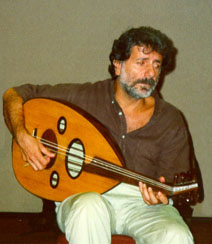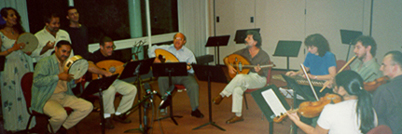
Marcel Khalife performs to interested students (photo Turath.org)
Marcel Khalife On East and West
20 August 1999, Mount Holyoke College, Massachusetts
"We can leave our unique fingerprints on what the future generations will consider part of their heritage."
Asmar: Although you sing in Arabic and play the leading Arab instrument, the ‘ud, many think of you as a musician who “composes in Western style.” Do you make a distinction between Eastern and Western music in your compositions?

Marcel Khalife performs to interested students (photo Turath.org)
Khalife: This is a good topic to discuss with the entire group at this gathering. I’d like them to hear the answer too. To answer you, I can ask you: if you organize Arab music; if you modernize it; if you give it a higher level of precision, is that Westernization? Not particularly. The West organized their music and we can too but not to make it Western. My work, for example, is an effort to modernize Arab music and needs to be recognized as such. When I say modernize, I don’t mean in the sense of what one sees on television and the so-called video clips; many critics limit their understanding of Westernization to that.
You just played with us my Bashraf Hijaz Kar Kurd which had harmony and other new musical elements; did you feel that it lost the spirit of the maqam Hijaz Kar Kurd because of these elements? Did they not add to it Bashraf? Did they not make the maqam shine? The ‘ud solo in this composition did not hurt the ‘ud, on the contrary, it featured the ‘ud. I hear criticism that this makes it sound like a guitar but the ‘ud is the father of the guitar so when one can produce a sound on the it that triggers an image of a guitar to some listeners that is not a surprise as long as the intent was not to imitate the guitar in the first place.
Note that this requires mastery of both western harmony as well our maqamat. What can be done with a maqam like nahawand, equivalent to a western minor scale, cannot be done with bayyati or maqamat with microtones. One also has to know when to compose for a small takht (traditional ensemble) or an orchestra with a large string section that can support the ‘ud.

Our work should be considered exploratory and somewhat experimental. It is making a path for future work that needs continuing and through scientific study. Rule and guidelines will result from such exploration. These new attempts can produce an equation that will do justice to Arab music. Musical heritage (turath) is not static. The work of Sayyid Darwish proved that turath can be dynamic. We can leave our unique fingerprints on what the future generations will consider part of their heritage.
Asmar: The ‘ud has traditionally been used as an instrument that accompanies the vocalist. You and others in this movement are taking the ‘ud in the direction of featuring it as an instrument in its own right and are composing instrumental pieces to highlight its versatility. What is the objective of this movement?
It is so true that Arab audiences love singing. That is due to the special relationship between the Arabs and their language. Poetry and rhetoric have been the most powerful art form in our culture and have overshadowed other arts. As a result, musical instruments have been relegated to the task of accompanying vocalists. It was not until the Ottoman era that the forms of Samai'i, Bashraf, and others were created; I consider these to be evolved forms. With them, Arab audiences started accepting listening to music without song but that is still not popular. Followers of non-singing instrumental compositions are still small compared to other parts of the world.
It is difficult to "sell" pure musical works to Arab masses for obvious historical reasons. We need to change that by exposing more and more people to the beauty of the musical text, not poetic text.
My background is music and I, for one, can express myself through music. It took a lot of courage for me to sing and I sang only to express myself through the qasa'ed poetry that I loved. I am not a mutrib, however. When I composed the 'ud duet called Jadal, it took even more courage to perform the work in public. We sent out the message: do not come if you're hoping to hear singing. People still came, nobody sang, and the audiences clapped in appreciation. There is a lot of potential for this genre and we are doing our part to contribute to its success.
Copyright © 1999-2002 Turath.org All rights reserved